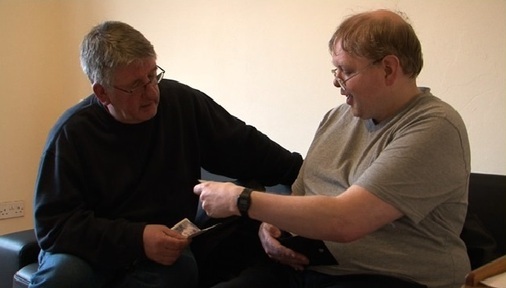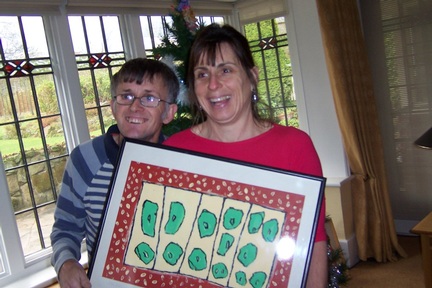Shared Lives transforms lives of disabled adults and older people
Shared Lives has transformed life for Neil Rogers who has a learning disability, giving him at long last, a place he can call home.

Mr Rogers lives in a seaside town and used to spend a lot of time drinking in pubs in the town. He gradually spent more and more time at Mark and Alison Simpson’s pub.
The pair were concerned about his drinking, his behaviour and increasingly, his safety. He even began sleeping rough on their doorstep.
Mr and Mrs Simpson approached the council and were told about Shared Lives. They put themselves through the recruitment, training and approval procedures and became registered Shared Lives carers, meaning he could live them and their house could become his home.
Shared Lives describes itself as a radical form of care, that involves people sharing their homes, which enables disabled adults and older people to keep their independence and lead fulfilling lives.
Neil Rogers’ sister recently told Mrs Simpson that, since he moved in with them, he looks people in the eye for the first time.
He now takes care of his appearance and has control over his drinking and people say they can now understand his speech. He has also achieved long-held ambitions like going to Wembley.
"What I wanted was a family"
Mr Rogers says: “Now I know what I wanted: what I wanted was a family”. Mrs Simpson has found his behaviour has changed completely. “He brings a whole new dimension to our lives, we get as much pleasure as he does in our ‘family’. We are even thinking of getting out of the pub trade to become full time carers”.
The first ever national report into Shared Lives in England reveals the scheme is now helping nearly 10,000 people and many enjoy more fulfilling lives as a result.
Over 90 per cent said they made new friends, with half going on holiday for the first time, and over a quarter of users have joined a club not exclusively for disabled people for the first time in their lives.
Shared Lives is used by people with learning disabilities, people with mental health problems, older people, care leavers, disabled children becoming young adults, parents with learning disabilities and their children, people who misuse substances and (ex-) offenders.
It can involve students going to live with older people who have become isolated or anxious about living alone or disabled adults going to live with a family which can give them emotional and practical support.
Paul has also found his life has been transformed by Shared Lives. He recently moved in with approved Shared Lives carer, Sheila and her family. Sheila helped Paul to get a bus pass, to learn to use public transport and to cross roads safely, so that he can walk by himself in his community for the first time in his life.

He bought his first ever bike and enjoys long bike rides with Sheila and her husband.
Paul has discovered painting and his framed pictures can be found in Sheila and her family’s homes. Sheila encourages everyone in the community to ‘look out for Paul’. Paul doesn't have a lot of speech, but when asked if he understands what 'independent' means, he smiles and says 'walk'.
Shared Lives helps people who in some cases have been seen as ‘too challenging’ to live better lives, whilst providing major savings for taxpayers, according to Alex Fox, chief executive of Shared Lives Plus, the UK network for Shared Lives schemes and carers.
Shared Lives has potential to transform adult social care system
He said the report shows how the sector is growing across the country, with 90 per cent of schemes looking to recruit new Shared Lives carers, and many others expanding the Shared Lives model to provide support for other groups such as older people.
“This study shows the potential for Shared Lives to transform not just the lives of individuals, but also help transform our adult social care system by delivering major savings and improved benefits, at a time when an ageing population and falling budgets are presenting the NHS and local authorities with a uniquely difficult challenge.”
Shared Lives carers are recruited, vetted, trained and supported by local Shared Lives schemes, who have to be registered with the Government's care regulator, Care Quality Commission.
Critics of the scheme have voiced concerns over safeguarding but the scheme is keen to point out that the CQC logged 3,473 safeguarding alerts and 39,115 safeguarding concerns related to social care provision in England 2011/12. Of those, 109 concerns and just one alert arose from Shared Lives.
In 2010, England’s care inspectors gave 38 per cent of Shared Lives schemes the top rating of excellent (three star): double the percentages for other forms of regulated care.
Shared Lives has cost benefits
The scheme is also a lot cheaper than a residential care home according to Shared Lives.
When people labelled ‘challenging’ have moved from care homes or ‘assessment and referral units’ into Shared Lives households, annual savings of up to £50,000 per person have been realised, with the average saving £13,000 per person, according to the scheme.
Some media reports have compared Shared Lives to fostering.
However, SharedLivesPlus does not like this analogy as it implies that adults may be treated like children.
Mr Fox said: “We strongly discourage use of this analogy which does not reflect the reality of Shared Lives. Older people using Shared Lives and their families consistently report that in Shared Lives arrangements, they feel treated more like an individual and a human being than their experience of more task-focused and paid-by-the-hour models, which can feel rushed and impersonal, or involve care from a succession of strangers.”
For more information on Shared Lives go to www.sharedlivesplus.org.uk/
Latest Features News
 28-Nov-19
2019 Election: Labour pledges £10.8 bn for free personal care while Boris Johnson sidelines social care
28-Nov-19
2019 Election: Labour pledges £10.8 bn for free personal care while Boris Johnson sidelines social care
 18-Oct-19
Podcast: Wendy Mitchell and dementia: 'My biggest fear is not knowing who my daughters are'
18-Oct-19
Podcast: Wendy Mitchell and dementia: 'My biggest fear is not knowing who my daughters are'
 30-Sep-19
World's oldest diver aged 96 says 'never accept the fact you are getting old'
30-Sep-19
World's oldest diver aged 96 says 'never accept the fact you are getting old'
 27-Sep-19
Exclusive: Care minister backs care workers' call for time off to grieve and attend funerals
27-Sep-19
Exclusive: Care minister backs care workers' call for time off to grieve and attend funerals
 20-Sep-19
Podcast: Gyles Brandreth urges care workers to learn poetry with elderly
20-Sep-19
Podcast: Gyles Brandreth urges care workers to learn poetry with elderly